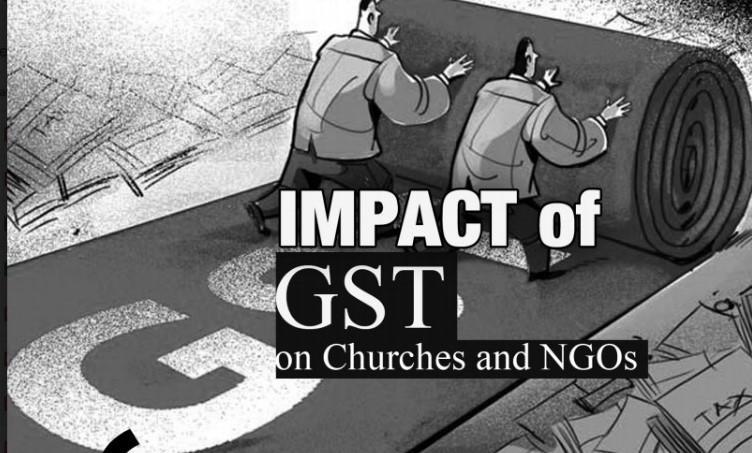
Impact of GST on Churches and NGOs

What is GST?
GST which stands for Goods and Services Tax, is a revolutionary tax reform undertaken by the Govt. of India which came into effect from 1 July 2017. The numerous indirect taxes (like service tax, central excise, VAT, Entry Tax) are subsumed into one single tax, avoiding cascading tax effect (tax on tax) which is expected to be a win–win situation for all, from manufacturer to consumer. Though years of fierce negotiations between the center, states and other stakeholders have diluted the original intent of the act, it is a good beginning towards "One nation, One tax, One market".
In its current form, there are three taxes under GST - Central GST (CGST), State GST (SGST) and Integrated GST (IGST). The first two are applicable in case of supply of goods or services within a state and an equal share of tax goes to the center as well as the state (e.g., for a Service Tax of 18%, both the center and the state will receive 9% tax share). IGST will come into the picture in case of inter-state supply. GST is governed by the GST council which is chaired by the Central Finance Minister and consists of state finance ministers among others. Depending upon the classification as determined by the GST council, different rates are applicable for different goods (0%, 5%, 12%, 18% and 28%).
Goods
S.2 (52) of CGST Act defines Goods as “Goods” means every kind of movable property other than money and securities but includes actionable claim, growing crops, grass and things attached to or forming part of the land which are agreed to be severed before supply or under a contract of supply.
Services
The same act defines services under S.2 (102) as “Services” means anything other than goods, money and securities but includes activities relating to the use of money or its conversion by cash or by any other mode, from one form, currency or denomination, to another form, currency or denomination for which a separate consideration is charged.
Implication of GST on Charitable Activities
With the tsunami of articles, WhatsApp images and discussions around, you might be confused whether your ministry would come under GST. Let’s try to find out. It would be worthwhile to look at the scope of GST to find out if your ministry is liable to be registered under GST.
S.22 of the CGST Act states: (1) in the State or Union territory, other than special category States, from where he makes a taxable supply of goods or services or both, if his aggregate turnover in a financial year exceeds twenty lakh rupees. (10 lakhs in case of special category states) (2) Every person who, on the day immediately preceding the appointed day, is registered or holds a licence under an existing law, shall be liable to be registered under this Act with effect from the appointed day.
It means if your ministry is involved in the ‘supply’ of goods or services as defined by the act and if your aggregate turnover (including exempted goods and services) is more than Rs.20 lakhs during a financial year, or if you are already registered under any of the acts as on 30 June 2017 which got subsumed into GST, you will fall within the ambit of GST Act and need to register.
It means if your ministry (the definition of person includes trusts and societies too) is involved in any activity that includes a ‘supply’ of goods or services for a consideration (fees), you will come under GST. It indicates that if you provide your services without any charge, you may not fall under GST.
Registration under GST
If your organisation is covered under the ambit of GST, you need to apply for registration within 30 days from the date on which you become liable for registration. All those who are registered under the Act will be provided with a unique GST Identification Number (GSTIN). Even if your services do not come under the purview of GST, you need to know the provisions of GST, as the vendors you deal with, renting of your office building and the like may have GST implications. Thus kindly refer to the GST website (http://www.gst.gov.in/) and also consult your Chartered Accountant.
The ‘Good and Simple Tax’, as GST is described, is not that simple! The GST council is coming up with different notifications day by day, confusion is increasing and it would take a while for the dust to settle down. The intent of the Govt. is to cover as many areas as possible. It will have many implications for NPOs. We need to keep a tab on the developments and discern its impact for our ministry and comply with it. Let’s not try to avoid GST, but rather submit to the governing authorities as instructed by Paul in Romans 13:1.


